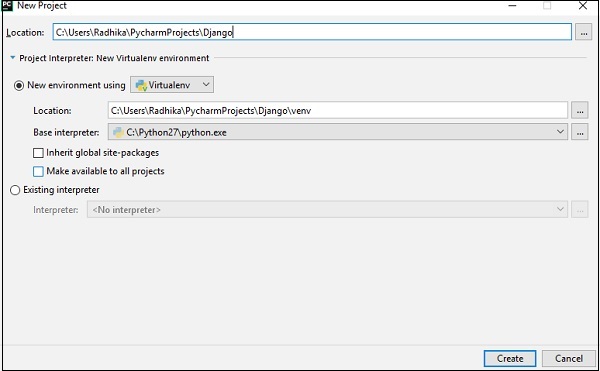

- #HOW TO CONNECT DATABASE IN PYCHARM FOR DJANGO HOW TO#
- #HOW TO CONNECT DATABASE IN PYCHARM FOR DJANGO PASSWORD#
- #HOW TO CONNECT DATABASE IN PYCHARM FOR DJANGO FREE#
Flush the privileges so that the current instance of MySQL knows about the recent changes you’ve made:
#HOW TO CONNECT DATABASE IN PYCHARM FOR DJANGO PASSWORD#
Remember to choose a strong password for your database to replace password in this example: First, create the user and set their password by typing the following command. You’re going to create this account, set a password, and grant access to the database you created.
#HOW TO CONNECT DATABASE IN PYCHARM FOR DJANGO FREE#
We will use the name djangouser in this guide, but feel free to use whatever name is relevant for you. Creating specific databases and accounts can support you from a management and security standpoint. Next, create a separate MySQL user account that Django will use to operate the new database. You’ll receive output similar to the following, assuming that you haven’t created any databases yet: Inspect the current databases with the following command: You’ll know you’re in the MySQL server when the prompt changes: To set this up, connect to your MySQL database as the root MySQL user with the following command: In order to do this, you need to create a database on your MySQL instance as well as a MySQL user profile that Django can use to connect to the database.

Step 1 - Creating the Databaseĭjango supports a number of popular database management systems, but this guide focuses on connecting Django to a MySQL database. Once everything is installed and set up, you can move on to the first step.
#HOW TO CONNECT DATABASE IN PYCHARM FOR DJANGO HOW TO#
For this, follow our tutorial on How To Install Python 3 and Set Up a Programming Environment on an Ubuntu 20.04 Server. Follow our tutorial on How To Install MySQL on Ubuntu 20.04. MySQL installed to serve as the database.Follow our Ubuntu 20.04 initial server setup guide. An Ubuntu 20.04 server with a non-root sudo-enabled user and a firewall.To complete this tutorial, you will need: This will involve creating the skeleton structure of the blog web application using django-admin, creating the MySQL database, and connecting the web application to the database.ĭjango will provide you with a development environment to work on your blog web application, but you will need to take more steps before making your blog live on the internet. In this tutorial, you will learn how to set up the initial foundation for a blog website with connections to a MySQL database. This tool allows for scalability, re-usability, and rapid development. Django is a free and open-source web framework written in Python.


 0 kommentar(er)
0 kommentar(er)
